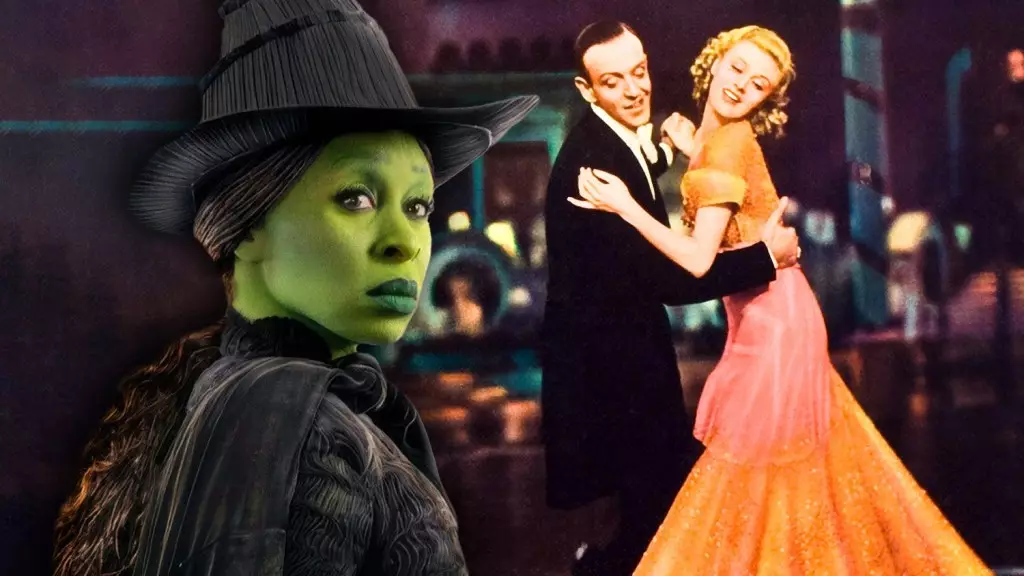The genre of musicals has experienced a significant resurgence in recent years, marked by contemporary adaptations and new narratives that diverge from the traditional joyful themes of earlier cinematic treasures. While the films of yesteryear, such as those produced by MGM, conjured up visions of unadulterated joy and melodic euphoria, this latest cycle of musicals introduces a more complex emotional tapestry, reflecting an era characterized by uncertainty and multifaceted human experiences.
During the trying times of the COVID-19 pandemic, many individuals sought solace in the vibrant, uplifting numbers of classic musicals, finding comfort in the nostalgic melodies of Singing in the Rain and the spirited dance routines of stars like Fred Astaire. However, as we transition into a new era of musicals, it is evident that the tone has shifted dramatically. The latest entries, while poised for both critical acclaim and commercial success, often lack the effervescent happiness typically associated with musicals of the past. Instead, they present characters embroiled in more intricate emotional landscapes.
The traditional musicals often featured protagonists who were uncomplicated and archetypal. Characters like Gene Kelly’s in Singing in the Rain were predominantly cheerful and carefree, embodying an idealized version of life that resonated with audiences. In contrast, the recent wave of musicals brings forth a new era of storytelling, with multifaceted characters riddled with internal and external conflicts. This nuanced portrayal not only aligns with contemporary societal issues but also provides a mirror to the audience’s own struggles and aspirations.
The contemporary musical landscape has brought forth a cast of characters that reflect the complexities of modern existence. For instance, Timothée Chalamet’s portrayal in Wonka goes beyond mere charisma, inviting viewers to engage with the essence of identity and the search for meaning in a chaotic world. Unlike previous characterizations that often relied on charm and wit, today’s characters resonate on a deeper emotional level, embodying insecurities and existential dilemmas.
Other notable performances in this cycle include Angelina Jolie’s haunting portrayal of Maria Callas, a once-celebrated diva grappling with both artistic decline and personal strife. This narrative dives into the depths of human frailty, where the glamorous sheen of stardom gives way to the stark reality of personal battles. Similarly, the character dynamics in Emilia Pérez, portraying the complexities of identity and aspiration against the backdrop of societal constraints, shift the landscape of what it means to be a protagonist in a musical.
The contemporary musical not only entertains but often serves as a political and social commentary. Films like Wicked provide a platform to explore themes of acceptance, discrimination, and empowerment through engaging narratives and stunning musical numbers. As audiences increasingly seek stories with depth, the integration of pressing societal issues into the fabric of musicals reflects a broader shift within the genre, aligning it with modern tastes.
Moreover, films such as Babygirl and Nightbitch hint at a cinematic universe that is ripe for lyrical adaptation, demonstrating that inspiration and creativity know no bounds. The growing acceptance of musicals that embody serious themes fosters a unique space for storytelling that resonates with audiences across different demographics.
As the musical genre continues to evolve, it presents an opportunity for artists and creators to push boundaries and redefine traditional narratives. The current crop of musicals is not merely a nostalgic homage to the past but a reflection of our contemporary experiences. This evolution can be seen in how new stories prioritize emotional authenticity over superficial charm.
As we look towards the future, it will be fascinating to see how these multifaceted characters and their intricate narratives will further shape the ongoing legacy of musicals in film and theater. The potential for continued innovation remains vast, promising audiences an even richer tapestry of storytelling that navigates the complexities of the human experience while delivering the lyrical beauty they yearn for.
The current musical landscape represents a crucial pivot point, showcasing both the trials and triumphs of modern humanity through its complex characters and intricate narratives, heralding a new era that honors both creativity and authenticity in every performance.

